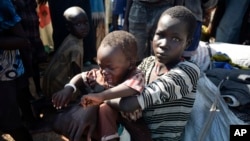South Sudan is marking its fourth independence anniversary Thursday, but there is little to celebrate as citizens suffer from an ongoing civil conflict and a deepening humanitarian crisis. The international community has laid the blame on the country’s rival political leaders.
South Sudanese civilians have paid the greatest cost for the war that began in December 2013 when a political fallout between President Salva Kiir and his rival, former Vice President Riek Machar, spiraled into inter-ethnic violence.
Since then, tens of thousands have been killed, more than two million have been displaced and millions more are facing food insecurity.
Policy analyst Nhial Tiitmamer, of the Sudd Institute in Juba, said there were understandably mixed feelings on the occasion of the country’s hard-fought independence from Sudan.
“The people on the one hand are happy to mark the fourth independence anniversary of South Sudan, and the others, they are worried about tomorrow because of the ongoing conflict,” said Tiitmamer.
South Sudan’s economy, which is dependent on oil exports, has been hit hard by the conflict and the collapse of oil prices worldwide.
Tiitmamer said this was where the people in the capital felt the most immediate impact.
“To import goods, you need to get hard currency, and this has made living standards really hard for the people because the price of major goods is skyrocketing,” said the analyst.
Both sides have been accused of committing rights violations during the conflict including the forced recruitment and sexual abuse of children.
Some 150,000 people are taking refuge in U.N. compounds across the country.
U.N. Secretary General Ban Ki-moon said “hope is in short supply” in South Sudan. He called on President Kiir and Machar to “prove their leadership by investing in a political solution.”
In a recorded message to the South Sudanese people, U.S. National Security Advise Susan Rice said it “breaks [her] heart to see what South Sudan has become.”
She laid the blame on the country’s leaders. “President Kiir and Riek Machar and their cronies are personally responsible for this new war and self-inflicted disaster. And only leaders on both sides can end this violence,” said Rice.
The two sides have been engaged in lengthy peace negotiations mediated by the East African regional bloc IGAD, but have failed to produce a lasting deal.
The rival factions blame each other for stalling the process, which has been hung up mostly on a proposed power-sharing agreement and reunification of the armed forces.
On Wednesday, President Kiir began a new three-year term in office after lawmakers voted to extend his mandate.




